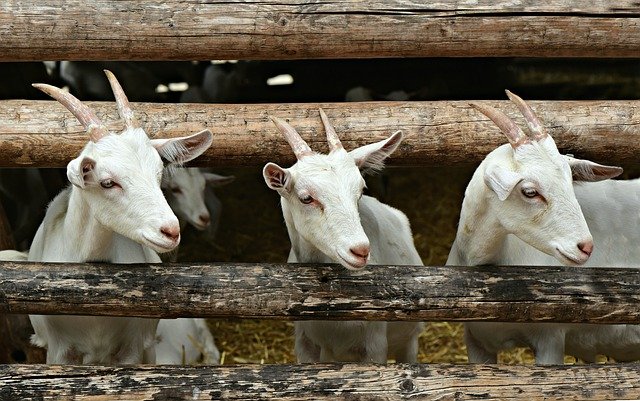Feeding Goats Tricker than Many Expect
Those new to raising goats are often surprised to learn that goats can be picky eaters. Couple this with their complex digestive systems and feeding time can get tricky.
For goats to remain healthy, it is important to provide them with quality food that they enjoy. It also is important to understand how goats digest food. As ruminants, goats have a four-compartment stomach designed for digesting browse or hay. Unlike many other grazing species, goats can readily digest cellulose, the fibrous part of plant material. They also prefer browse – such as brush, twigs and weeds – to tender grass.
Goats are unable to digest a great deal of concentrates like corn or oats or commercial goat feed. When goats are fed these things it can lead to bloating or death. In male goats it can cause urinary stones.
While some pregnant or lactating goats or growing kids require grain, they do not require a great deal of it. In almost all cases, quality grass hay is all a goat requires. This hay should be fresh and free of any dust or mold. It is a good idea to store it so that animals such as cats, mice or birds don’t soil it. This also will allow it to stay fresher, longer. Keep in mind that goats refuse to eat anything off the ground, so a feeder is a smart investment.
All classes of goats require supplementary minerals, best fed as a loose product from specialized mineral dispensers. Minerals should be formulated specifically for goats. Goats require a significant amount of copper and selenium in their diets. Parts of the U.S. are selenium-deficient so the selenium content of commercial mineral mixes might be inadequate. Consult your vet to decide if you need to supplement.
The average goat needs one to three gallons or more of clean, fresh water every day. Of course, water requirements will depend on what a goat eats, the temperature and other factors. Goats feeding in green pastures will get much of their water from what they eat. A lactating goat, a nursing kid, or a goat eating dry hay, on the other hand, will require more than three gallons of water.
It is best to have small containers of water as opposed to one big one since goats like their water – like their food – clean. Encourage water consumption by placing containers near where goats congregate in the shade during summer. In the winter, it may be necessary to use a bucket or tank heater to keep water from freezing.
Finally, goats are creatures of habit. Change causes stress which can lead to a variety of health problems so adhering to a schedule is critical. If you must change rations, do it gradually since some the digestive microbes in their rumen needs time to adapt to feed changes.

